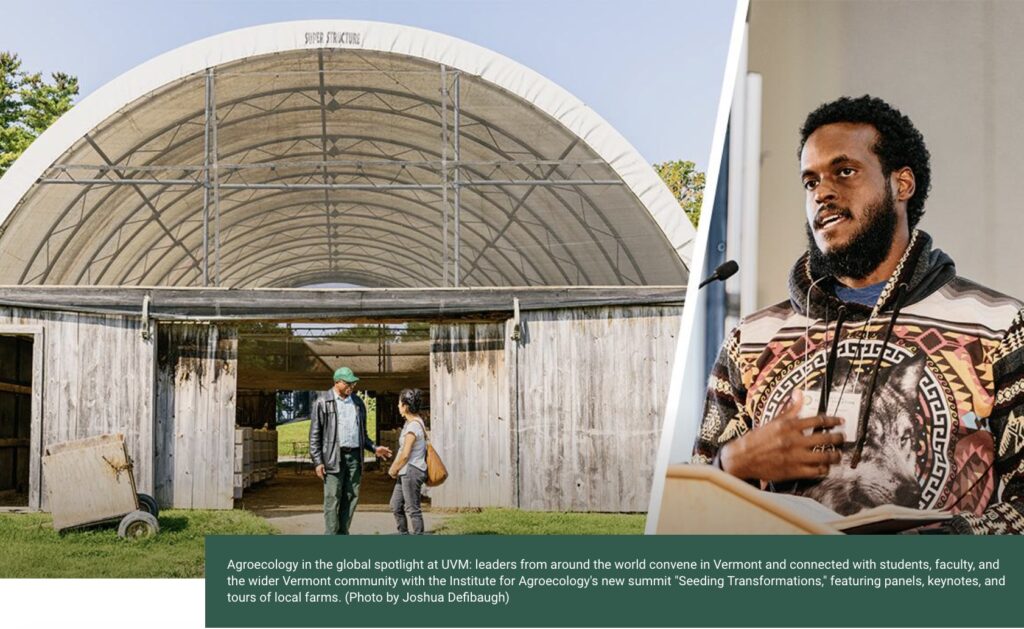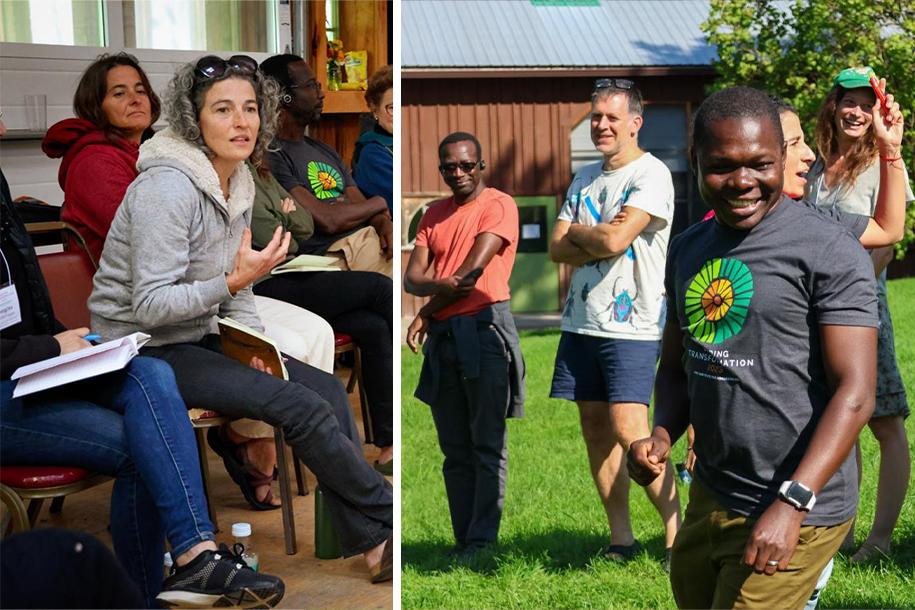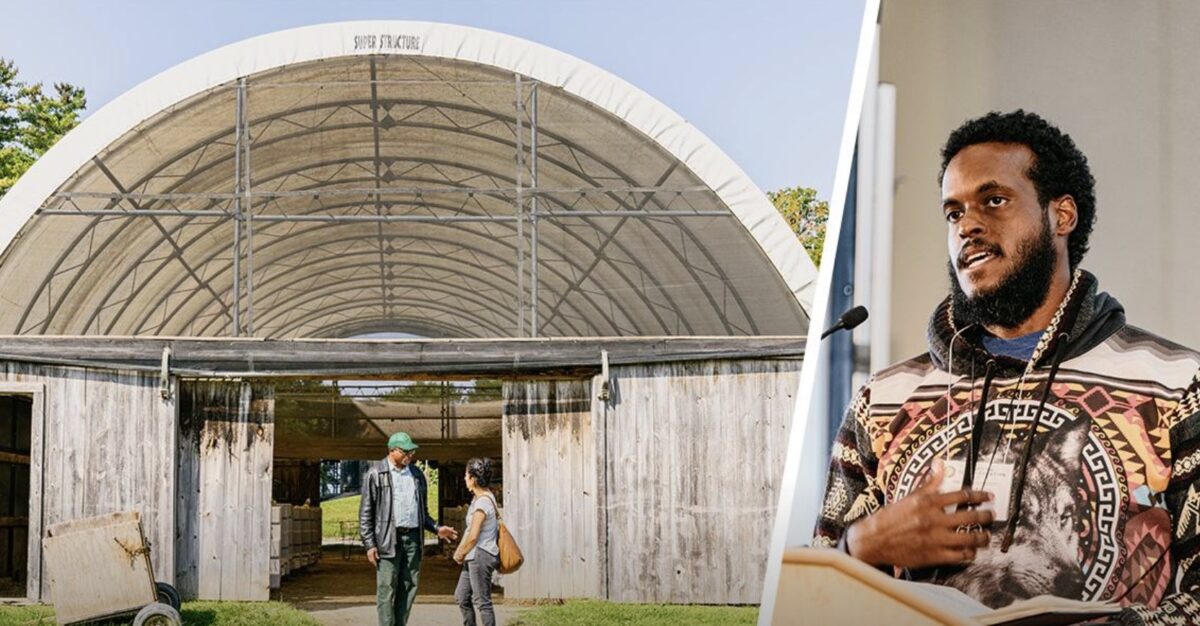
The University of Vermont’s new Institute for Agroecology (IfA) held its flagship summit, Seeding Transformation, a global forum on food systems and agroecology last week to mark the launch of its global programs. Hundreds of people convened at the Davis Center, while others around the globe watched by live-stream, exploring agroecology’s potential as a transformative solution to regenerate the environment, cool the planet, and provide good, healthy food for all.
With diverse panels made up of academic, social movement and farmer voices from Africa, Latin America, North America and Europe, the conversation ranged from the need for paradigm shifts to grounded proposals for expanding the practice and use of agroecology in the US and worldwide.
“We’re trying to center the University of Vermont as an impact-driven institution, and agroecology is an amazing fit with what already is happening at UVM,” Vice President for Research and Economic Development Kirk Dombrowski said in his opening remarks to the summit. “Vermont is a different kind of place and UVM is a different kind of university. Food systems are absolutely at the center.”
Anna Lappé, Executive Director of the Global Alliance for the Future of Food and national bestselling author and advocate for food justice and sustainability, delivered the summit’s opening keynote, laying out the risks from mainstream high-input, fossil-fuel dependence and unequal food system, while articulating possibilities for positive, impactful change.
“I’m aware that all of us, no matter where are, gather with the specter of the climate crisis all around us,” Lappé said. “I read headlines about the heartbreak[ing floods] in Libya but also here in Burlington, I listened to your farmers at Intervale Community Farm talk about what is was like in July to be harvesting food in the morning and then, several hours later, kayaking across completely flooded farm fields where everything was lost.”

Lappé continued: “But if this time should teach us anything, it’s that we have no idea what’s going to happen next and from that comes a deep and profound sense of possibility and I certainly feel that today, standing here at such a special occasion, the launch of this incredible new Institute for Agroecology at a public, land-grant university in the United States of America.”
Speakers and panelists ranged from leaders here at UVM, farming collective organizers, academics, and educators in the field of agroecology. The first panel, “Big Ideas and Big Breakthroughs Driving Just Transitions in Food Systems,” moderated by Martha Caswell, the IfA’s Associate Director of Community and Learning, featured Blain Snipstal of the Black Dirt Farm Collective, who spoke about “afroecology,”
“Afroecology is the form of art, movement, practice and process of social and ecological transformation that involves the re-evaluation of our sacred relationships with land, water, air, seeds and food,” Snipstal said. “So much of the black experience in the U.S., the agrarian experience, is grounded in the legacies of farmers who are still tilling the land. Part of our process is to rediscover their seeds, their knowledge, their understandings and put them into an organizing process that can galvanize the next generation of producers and organizations working within our context.”
Beyond the panels and keynotes at the Davis Center, dozens of summit participants experienced the local food system in and around Burlington, including visits to the Burlington Farmer’s Market, the Intervale Center, the UVM Horticulture, Research and Education Center, and Shelburne Farms.
Batamaka Somé, an anthropologist from west Africa and Regional Leader in the McKnight Foundation’s Global Collaboration for Resilient Food Systems, traveled from his home in Burkina Faso to attend Seeding Transformations to strengthen his connection to the IFAs global network and to deepen his understanding of agroecology as a transformative pathway to a more just and sustainable food system.
“I’m a social scientist and there are things that I was sure I knew but I was challenged, I questioned myself on issues and I think it was a good opportunity to improve and cultivate my knowledge,” Somé said. He also commended the IfA and the summit for hosting a global audience.
“We live in a world where intolerance is much more seen and we tend to forget it’s the loudest voices from the few that we can hear, but there are the silent voices of the many,” Somé continued. “What has been done here addresses that reality. People have come from all over the world. It’s impressive to see people sharing not just their practices, but also the theories and people from different disciplines seeing how they can get together to advance and solve the issues not just of agriculture but food systems. It’s amazing.”

Following the global forum, the IFA team hosted the 50 international collaborators for a 3-day planning retreat to develop joint research, learning and action. The conversations and planning that ensued will inform the IfA’s global programs which are supported by the McKnight Foundation and the 11th Hour Project, among others. Some of the ideas, programs and projects that were discussed and advanced at the retreat included:
- Supporting agroecology schools in grassroots farmer organizations around the world, including in Vermont.
- Building a transatlantic partnership with like-minded institutions to cultivate the next generation of research leaders for agroecology and to develop a global network of educational programs supporting agroecological transformations.
- Influencing policy processes for biodiversity conservation at international (COP15) and national levels.
- Amplifying the focus on youth, women and feminism in agroecology
- Strengthening Agroecology in Latin America through building networks.
- Mobilizing evidence for agroecology for change in policy, practice and to shift narratives that undermine agroecology
- Centering land access and campaigns to support community-based farming and learning centers
- Working to change the mechanisms for agricultural and development funding so that they are better designed to support agroecological transformations.
Stay tuned for more to come by watching the IFA website and social media channels.
(Instagram | Facebook | Twitter | LinkedIn)
Written by Joshua Defibaugh.

